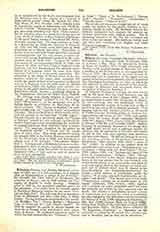

Bolgeni, GIOVANNI VINCENZO, theologian and controversialist, b. at Bergamo, Italy, January 22, 1733; d. at Rome, May 3, 1811. He entered the Society of Jesus, October 31, 1747, taught philosophy and theology with marked success at Macerata and was a member of the Society when it was suppressed by Clement XIV. Henceforth he devoted himself to controversy and in recognition of his signal services against Jansenism and Josephinism, Pius VI appointed him Theologian-Penitentiary, an office of which he was deprived by Pius VII on account of the Jacobin principles he tolerated and advocated during the occupation of Rome by Napoleon I.
Of Bolgeni’s theological writings, the best known and at the same time the least fortunate was his “Della carita o amor di Dio” (Rome, 1788). In it he endeavored to refute the Dominican, de Rubeis, by demonstrating that the theological virtue of charity essentially consists in loving God as He is good to us and not as He is absolute goodness. This position won for him misrepresentation at the hands of Teofilo Cristiani, fictitious author of “Lettera teologico-critica sull’ amore di Dio” (1791) and opposition from his former Jesuit comrades, Mazzarelli (1790-91), Rego no (1791), Cortes (1790-93), Chantre y Herrera (1790-92) and Gentilini (1803). Against Cristiani he successfully disposed of the charge that he held purely servile fear a sufficient motive for attrition, but the arguments of his other adversaries he met at first with more subtlety than precision, and later with silence. He did not attempt to answer the searching criticism of his doctrine contained in Palestrina’s “Idea genuina della carita o amor di Dio” (1800): In addition to his original work he contributed to the controversy, “Schiarimenti in confermazione e difesa della sua dissertazione” (Rome, 1788; Foligno, 1790), and “Apologia dell’ amor di Dio detto di concupiscenza” (Foligno, 1792). Though practically defeated in this dispute Bolgeni’s presentation of his case proved that he was endowed with controversial talents of no mean order, and these he used with telling effect in his writings on moral subjects and on matters which may be classed as politico-theological. As Theologian-Penitentiary he edited a novel defense of probabilism under the caption, “Il posesso, principio fondamentale per decidere i casi morali”. The second part of this work, “Dissertazione seconda fra le morali sopra gli atti umani” (Cremona, 1816; Orvieto, 1853), together with a treatise on usury, published under his name but probably not written by him, appeared after his death. The defense of probabilism aroused a storm of controversy, and among the noted anti-probabilists who engaged in the discussion may be mentioned the Bishop of Assisi (1798) Agapitus de Palestrina, O. Min. Ref. (1799), Cajetan Maria de Fulgore (1798), Canon John Trinch of the Cathedral of Tivoli (1850), and Montbach (1857). Of these Trineh added to hie “Il Bolgenismo Confutato” a “digression on the necessity of confessing all mortal sins, whether certain or doubtful, just as they are in conscience.”
The remaining productions of Bolgeni are chiefly devoted to attacks on Jansenism, Josephinism, and Jacobinism. Not long after the suppression of the Society of Jesus he entered the lists with the Society‘s traditional enemy, Jansenism, by publishing “Esame della vera idea della Santa Sede” (Macerata, 1785; Foligno, 1791), a work undertaken in refutation of the Jansenistic doctrines contained in “La Vera Idea della Santa Sede” by Pietro Tamburini, a celebrated professor of the University of Pavia. Several replies to the criticisms of Tamburini and to the censures of the Archpriest Guadagnini were published in rapid succession. In 1787, he wrote “Stato de’ bambini morti senza battesimo”, and in it scored the rigid doctrine of Guadagnini that infants dying without baptism are doomed to the torments of Hell. This controversy over, he devoted his pen to defending the juridical powers of the hierarchy, cataloguing the errors of the day, and combating the principles of Josephinism in Austria and of the Revolution in France. His publications at this period were: “Fatti dommatici ossia dell’ infallibility della Chiesa nel decidere sulla dottrina buona, o cattiva de’ libri” (Brescia, 1788); “Specchio istorico da servire di preservativo contra gli errori correnti” (1789); “L’episcopato ossia della potesta di governare la Chiesa” (1789). These literary labors led to his appointment by Pius VI as Theologian-Penitentiary and in this capacity he issued a defense of “L’episcopato” (Rome, 1791), and “Dissertazione sulla giurisdizione ecclesiastica” (Rome, 1791), a refutation of George Sicard’s contention that the powers of orders and jurisdiction were identical. About the same time he renewed his attacks on Guadagnini and Tamburini, refuting the former’s state-deifying proclivities in “L’Economia della Fede Cristiana” (Brescia, 1790), and the latter’s anti-ecclesiasticism in “Problema sei Giansenisti siano Giacobini” (Rome, 1794). “L’Economia della Fede Cristiana” was of such merit that it was incorporated by Migne in his “Demonstrations Evangeliques”, vol. XVIII.
The last phase of Bolgeni’s life is to say the least a strange one. After Napoleon I had seized Rome, Bolgeni, with wellnigh unintelligible inconsistency, favored the anti-regal oath of allegiance imposed by the conqueror. This change of front he defended vigorously and subtly, but vainly. He was obliged to make a retractation in the presence of the cardinals assembled at Vienna for the election of a pope; “Ritrattazione di Gio. Vincenzo Bolgeni diretta a Monsignor Illmo. e Rmo. Vicegerente di Roma”. His writings during this unfortunate stage of his career were: “Parere sul giuramento civico” (Rome, 1798); “Sentimenti de’ professori della university del Collegio Romano sopra it giuramento prescritto dalla Republica Romana” (Rome, an. VII); “Sentimenti sul giuramento civico” (Rome, an. VII); “Metamorfosi del dott. Gio. Marchetti, da penitenziere mutato in penitente” (1800); “Parere … sull’ alienazione de’ beni ecclesiastici”; “Schiarimenti” to confirm the preceding. After his death a work was edited, believed by some to be from his pen, “Dei limiti delle due potesta ecclesiastica e secolare” (Florence, 1849), and it was put on the Index donec corrigatur. It is most probably unauthentic.
J. T. LANGAN

